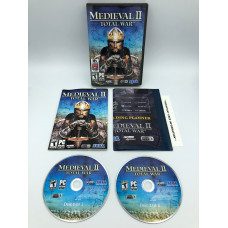Game: Medieval II: Total War
Condition: Pre-Owned
Included: 2 Game Discs, Manual, Building / Unit Planner & Case
License: Product License Key Included
Year: 2006
Medieval II: Total War is a turn-based strategy and real-time tactics video game developed by The Creative Assembly and published by Sega. It was released for Microsoft Windows on 10 November 2006. Feral Interactive published versions of the game for macOS and Linux on 14 January 2016. It is the sequel to 2002's Medieval: Total War and the fourth title in the Total War series.
The game is set between the years 1080 and 1530. Like the original Medieval: Total War, it focuses on medieval warfare, religion and politics in Europe, North Africa and the Middle East.
Gameplay
Similarly to previous titles in the Total War series, Medieval II: Total War consists of two main modes of play: a campaign mode and battles.
Campaign
The campaign, which is turn-based, allows the player to play as one of seventeen factions from the time period and build their nation economically and militarily in order to conquer other factions. Gameplay consists of controlling the faction's military, economic, and social systems in large campaign maps. During the player's turn, armies, fleets, and agents can be moved on the map. When an army engages another army, the player can choose to fight the battle personally in the battle mode, or automatically calculate the outcome.
The goal of the campaign depends on which type of campaign is played. The short campaign requires the player to defeat one or two enemy factions and control at least 15 settlements. The long campaign requires the player to control at least 45 territories and one or two significant cities, such as Jerusalem, Granada, Rome or Constantinople.
Territorial control in the campaign is represented by "settlements", which are large, notable communities. Unlike in previous Total War games, there are two different types of settlements: castles and cities. Cities primarily focus on buildings that boost one's economy, while castles primarily focus on buildings that allow for the recruitment of more advanced types of soldiers. Certain buildings in settlements can also allow the player to recruit agents that fulfill certain functions, like diplomats and spies. Under most circumstances, the settlements can be converted from one type to the other. Settlements can be governed by members of the player's family, who are also capable of leading armies as generals. The talents of family members (and other key characters) are affected by various statistics, like "Piety" and "Loyalty", which are in turn impacted by their character traits, personal experiences, and members of their personal retinue. For example, a character with a high "Command" stat can be expected to do better in battle than a character with a low stat.
Religion in the game is divided into three primary faiths: Roman Catholicism, Eastern Orthodoxy, and Islam. Unorganized pagan faiths and heretical sects are also represented. If a large portion of a settlement does not adhere to the state religion, unrest may ensue. Missionaries and religious buildings can be used to gradually convert members of other faiths to the state religion. Catholic nations must deal with the Pope, who can send special missions to Catholic rulers. Failure to obey the Pope may result in excommunication. The Pope may also call Crusades against hostile settlements. Muslim imams with a high "Piety" stat may similarly declare jihads.
Factions primarily interact with each other through diplomacy. Diplomatic actions include the creation of alliances, the securing of trade rights, and the giving or receiving of tribute. Factions may go to war with one another to secure more settlements or other concessions. Factions that are at war can use their armies to fight each other, which incorporates the battle mechanic of the game into the campaign. Several factions in the campaign are either not present or "dormant" when the game begins. The Mongols will invade at some point after the campaign has begun, often posing a serious threat to factions in their path. Later on, the Timurids will also invade, bringing war elephants with them. Late in the game, factions may also sail to the Americas, where they can encounter the Aztecs.
Battles
One of the main focuses on the Total War franchise is its representation of real-time battles in addition to the turn-based campaign. A battle consists of two or more armies from different factions fighting each other. Battles play similarly to those in Rome: Total War, with formations of various kinds of troops engaging in combat. The objective of the battle is to defeat the enemy army by completely destroying it or causing the whole army to flee; in a siege battle, the objective is to completely destroy the army or to take control of a plaza in the centre of the settlement. There is also an option which allows the player to allow for time limits on battles, meaning that the attacker must defeat the defender within a certain time limit or the battle results in a victory for the defender. Battles can exist as custom battles set up by the player, multiplayer battles between humans, historical battles based on real-life military engagements, or battles that occur between factions in the campaign.
| PC (IBM Compatible) | |
| Microsoft OS | Windows 2000, XP |
Medieval II: Total War
- Product Code: 0178
- Availability: In Stock
-
$19.99
Tags: Medieval II: Total War




